小学英语语法---一般疑问句和特殊疑问句 PPT
小学英语语法详解疑问句-选择疑问句、特殊疑问句、一般疑问句、否定句、
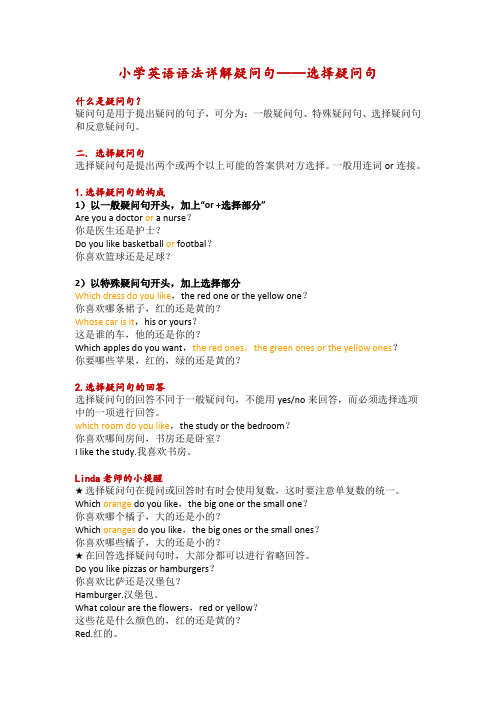
什么是疑问句?疑问句是用于提出疑问的句子,可分为:一般疑问句、特殊疑问句、选择疑问句和反意疑问句。
二. 选择疑问句选择疑问句是提出两个或两个以上可能的答案供对方选择。
一般用连词or连接。
1.选择疑问句的构成1)以一般疑问句开头,加上“or +选择部分”Are you a doctor or a nurse?你是医生还是护士?Do you like basketball or footbal?你喜欢篮球还是足球?2)以特殊疑问句开头,加上选择部分Which dress do you like,the red one or the yellow one?你喜欢哪条裙子,红的还是黄的?Whose car is it,his or yours?这是谁的车,他的还是你的?Which apples do you want,the red ones,the green ones or the yellow ones?你要哪些苹果,红的,绿的还是黄的?2.选择疑问句的回答选择疑问句的回答不同于一般疑问句,不能用yes/no来回答,而必须选择选项中的一项进行回答。
which room do you like,the study or the bedroom?你喜欢哪间房间,书房还是卧室?I like the study.我喜欢书房。
Linda老师的小提醒★选择疑问句在提问或回答时有时会使用复数,这时要注意单复数的统一。
Which orange do you like,the big one or the small one?你喜欢哪个橘子,大的还是小的?Which oranges do you like,the big ones or the small ones?你喜欢哪些橘子,大的还是小的?★在回答选择疑问句时,大部分都可以进行省略回答。
Do you like pizzas or hamburgers?你喜欢比萨还是汉堡包?Hamburger.汉堡包。
小学英语语法课件-疑问句 (共29张PPT) 全国通用
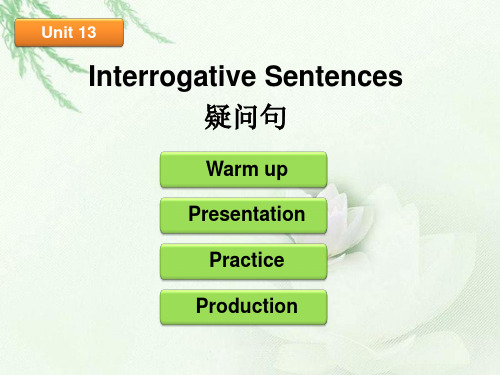
Presentation Grammar Box
Presentation Grammar Box
Presentation Grammar Box
Presentation Grammar Box
Presentation Grammar Box
Presentation Grammar Box
A. What
B. When
C. Where
D. Which
Production Quiz
Production Quiz
Practice Oral Practice
选择正确的答语。
A. By car. B. Yes, she has. C. Yes, I do. D. It’ s 10 dollars. E. He is my brother.
( E) 1. Who is he? ( A) 2. Do you go home by car or by subway?
Practice
Exercise 2
aren't you
Practice
Exercise 3
Practice
Exercise 4
5
PPrraaccttiicceeI Exercise 1
特殊疑问句 一般疑问句 一般疑问句 一般疑问句 反意疑问句
Practice
Exercise 2
aren't you didn’t she
My grandma has been to many places, _h_a_s_n_’_t _s_h_e_? Lily and Lucy will go to school next week, _w__o_n_’_t _th_e_y__?
小学英语句型简单讲解PPT课件
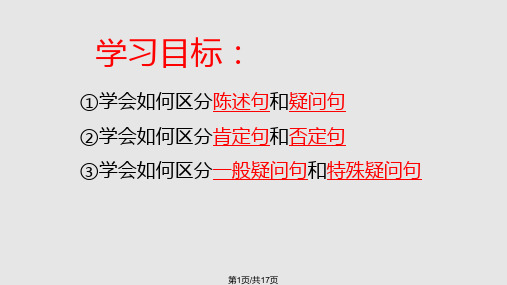
② -- What is Yaoming like ? 姚明长得怎么样? -- He is very tall . 他长得很高.
总结 特殊疑问句的回答,要根据实际 情况回答,不能用 Yes 或者No .
第15页/共17页
Summary :
1.陈述句 2.肯定句变成否定句的方法 3.疑问句 4.陈述句变成一般疑问句的方法 5.一般疑问句的回答 6.特殊疑问句
第16页/共17页
感谢您的观看!
第17页/共17页
这是艾米.
I am not Mr. He .
我不是何先生.
This is not Amy .
这不是艾米.
He is clever .
他聪明.
She is kind .
她和蔼可亲.
They are polite .
他们有礼貌.
He is not clever .
他不聪明.
She is not kind .
Is he young ? Is she kind ?
Be 动词 开头的问句,称 为一般疑问句.
Are they happy ?
Am I clever ?
特殊疑问词 开头 的问 句,称为特殊疑问句.
W__ho is your art teacher ? W__ho is Miss Green ?
__ W_h_at is she like ?
第2页/共17页
陈述句的定义:
陈述句是陈述一个事实或者说话人 的看法 ,书写时以句号结尾.
另外,陈述句又分为肯定的陈述句和 否定的陈述句,简称为肯定句和否定 句.
小学英语语法---一般疑问句和特殊疑问句ppt课件
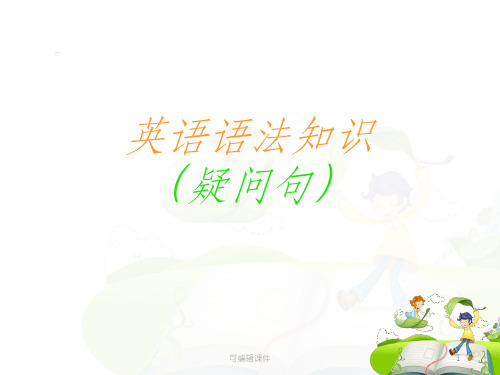
可编辑课件
4
e.g
This is Amy's bike.(一般疑问句)
Is this Amy's bike?
Yes, this is. (肯定回答)错误
No, this isn‘t. (否定回答)错误
Did you go to Beijing last weekend?
Yes, I did. (肯定回答)
2、如句子里是动词就在这些词前加 don't,doesn't,didn't
(1)主语是第一、二人称(复数)加don’t,第三人称单数加
doesn't
(2)如果是过去式就加didn't
例:I like dogs.
She likes swimming.
I don‘t like dogs.
She doesn’t like swimming.
No, I didn't. (否定回答)
I have some books. (一般疑问句)
Do you have any b可o编辑o课件ks?
5
变否定句的做法:
1、如句子里是be动词:am,is,are,was,were 就在这些词后加 not
例: He is Tom.
He is not Tom.
( B) 25. ______ tea did you have?
Two cups. • How many B. How much C. How soon D. Which
可编辑课件
15
感谢亲观看此幻灯片,此课件部分内容来源于网络, 如有侵权请及时联系我们删除,谢谢配合!
感 谢 阅
读感
谢
小学六年级英语语法总复习PPT课件

• 小学阶段不规则动词全表
• Infinitive Past tense Infinitive
• 1. am, is
was
2. keep
• 3.are
were
5. make made
4.become
7. blow
blew
8. read
• 9. buy
bought
10. ride
• 11. catch caught
fly-flying walk-walking
jump-jumping sleep-sleeping
climb-climbing fight-fighting
swing-swinging drink-drinking catch-catching pick-picking
watch-watching play-playing
dance danced
变y为 i+ed
study studied
动词的过去式(不规则)
go-went read-read eat-ate sing-sang take-took buy-bought see-saw swim-swam am,is-was do-did are-were have-had get-got leave-left fly-flew stop-stopped(双写)
.
• 一般现在时的变化
1. be动词的变化。
否定句:主语+ be + not +其它。 如:He is not a worker.他不是工人 一般疑问句:Be +主语+其它。 如:-Are you a student? -Yes. I am. / No, I‘m not. 特殊疑问句:疑问词+一般疑问句。如:Where is my bike?
小学英语语法PPT课件
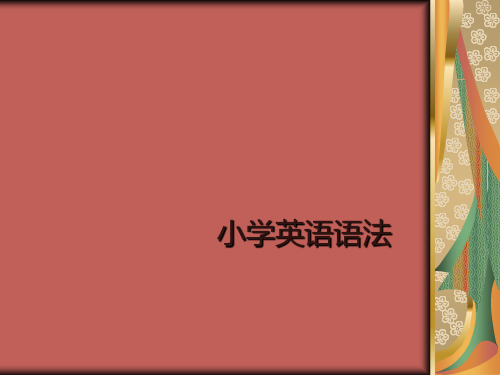
五、对划线部分提问。一般情况,一般将来时的对划线 部分有三种情况。 1、问人。Who 例如:I‟m going to New York soon. →Who‟s going to New York soon. 2、问干什么。What … do.例如: My father is going to watch a race with me this afternoon. →What is your father going to do with you this afternoon. 3、问什么时候。When.例如:She‟s going to go to bed at nine. →When is she going to bed? 六、同义句:be going to = will I am going to go swimming tomorrow(明天). = I will go
2.行为动词的变化。 否定句:主语 don„t( doesn‟t ) 动词原形( 其它)。 如: I don't like bread. 当主语为第三人称单数,用doesn„t构成否定句 如:He doesn't often play. 一般疑问句:Do( Does ) 主语 动词原形 其它。 如- Do you often play football? - Yes, I do. / No, I don't. 当主语为第三人称单数,要用does构成一般疑问句 如 -Does she go to work by bike? - Yes, she does. / No, she doesn't.
小学英语语法
名词复数规则
1.一般情况下,直接加-s,如:book-books, bag-bags, cat-cats, bed-beds 2.以s. x. sh. ch结尾,加-es, 如:bus-buses, box-boxes, brushbrushes, watch-watches 3.以“辅音字母 y”结尾,变y为i, 再加-es, 如:family-families, strawberrystrawberries
一般疑问句、特殊疑问句、选择疑问句、反义疑问句地详细用法
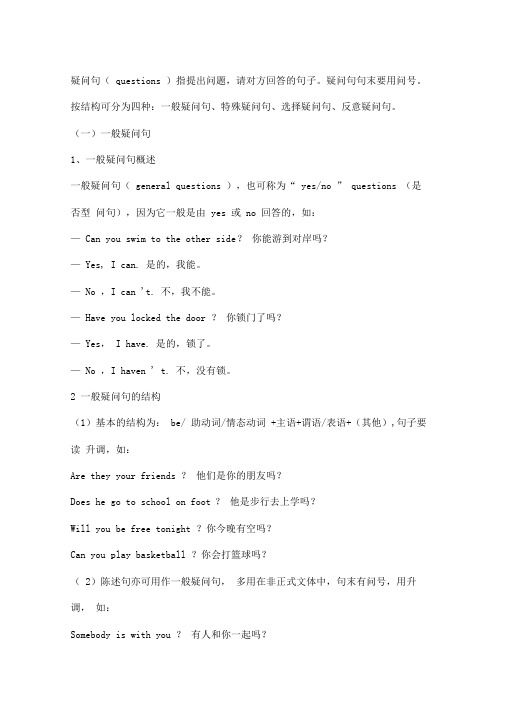
疑问句( questions )指提出问题,请对方回答的句子。
疑问句句末要用问号。
按结构可分为四种:一般疑问句、特殊疑问句、选择疑问句、反意疑问句。
(一)一般疑问句1、一般疑问句概述一般疑问句( general questions ),也可称为“ yes/no ” questions (是否型问句),因为它一般是由 yes 或 no 回答的,如:— Can you swim to the other side ?你能游到对岸吗?— Yes, I can. 是的,我能。
— No ,I can 't. 不,我不能。
— Have you locked the door ?你锁门了吗?— Yes, I have. 是的,锁了。
— No ,I haven ' t. 不,没有锁。
2 一般疑问句的结构(1)基本的结构为: be/ 助动词/情态动词 +主语+谓语/表语+(其他),句子要读升调,如:Are they your friends ?他们是你的朋友吗?Does he go to school on foot ?他是步行去上学吗?Will you be free tonight ?你今晚有空吗?Can you play basketball ?你会打篮球吗?( 2)陈述句亦可用作一般疑问句,多用在非正式文体中,句末有问号,用升调,如:Somebody is with you ?有人和你一起吗?He didn ' t finish the work ?他没有做完活吗?You are fresh from America , I suppose ?我猜,你刚从美国回来吧?3、一般疑问句的答语( 1)一般疑问句一般由 yes 或 no 来回答,如:— Are you tired ?你累了吗?— Yes,I am. 是的 ,累了。
— No, I ' m not. 不,不累。
— Does she do the cleaning ?她扫除了吗?— Yes , she does. 是的,她打扫了。
小学英语语法复习PPT课件

小学英语语法
写出下列各词的复数
I _____him ______ this _______ her _____ watch ___ child ____photo ______diary _____ day______ foot_____ book_____ dress ____ tooth____ sheep ____ box_____ strawberry __ thief _____you _____ peach___ sandwich ___ man_____ woman___ paper_____ juice_____ water_____ milk______ rice______ tea______
小学英语语法
一般将来时
一、概念:表示将要发生的动作或存在的状态及 打算、 计划或预备做某事。句中一般有以下时间状语:tomorro w, next day (week, month, year…),soon, the day after tomorrow(后天)等。 二、基本结构:①be going to do;②will do. 三、否定句:在be动词(am, is, are)l后加not或情态动 词will后加not成won’t。 例如:I’m going to have a picnic this afternoon.→ I’m not going to have a picnic this afternoon. 四、一般疑问句: be或will提到句首,some改为any, an d改为or,第一二人称互换。 例如:We are going to go on an outing this weekend. → Are you going to go on an outing this weekend
- 1、下载文档前请自行甄别文档内容的完整性,平台不提供额外的编辑、内容补充、找答案等附加服务。
- 2、"仅部分预览"的文档,不可在线预览部分如存在完整性等问题,可反馈申请退款(可完整预览的文档不适用该条件!)。
- 3、如文档侵犯您的权益,请联系客服反馈,我们会尽快为您处理(人工客服工作时间:9:00-18:30)。
(2)如果是过去式就加didn't
例:I like dogs.
She likes swimming.
I don‘t like dogs.
She doesn’t like swimming.
3、如句子里是情态动词是must,can,may,should 就在这些词后
加not
例句:You can watch TV now.
5. How was you weekend?
E. I watched TV.
Choose:选择
1. A: ___B____ did you go last Sunday?
B: I went to the library.
A When B Where C What D Who
2.Amy: __D_____ bought the new bike for you?
变否定句的做法:
1、如句子里是be动词:am,is,are,was,were 就在这些词后加 not
例: He is Tom.
He is not Tom.
2、如句子里是动词就在这些词前加 don't,doesn't,didn't
(1)主语是第一、二人称(复数)加don’t,第三人称单数加
doesn't
大家应该也有点累了,稍作休息
大家有疑问的,可以询问和交流
Mike: W__h_e_r_eare we going to this year? Mum: we will go to Harbin. Mike: _W_h_e_n__are we going to Harbin? Mum: On 10th Octomber. Mike: _H_o_w___do you go to there? Mum: By plane. Mike: W__h_e_re_are we going to stay in Harbin? Mum: In Grandma’s big house. Mike: _W_h_a_t_does Grandma like eating? Mum: She likes eggs very much. Mike: W__h_ic_h__season is the best time to Harbin? Mum: Winter. Mike: W__h_y__? Mum: Because we can make a snowman there.
问与答,连连看。
1. Who is this man? A. I went to the bookstore.
2. Where did you go yesterday? B. I am 45 kg.
3. How heavy are you?
C. My father.
4. What did you do last night? D. It was fine.
ow B Where C What D Who
3.A: Was this book in the desk?
小学英语语法知识 (疑问句)
Irene
一般疑问句
Is ………………?
Are ………………? Was ………………?
be动词
Were ……………?
Do ………… ?
Did …………?
助动词
Does ………… ?
Can ………… ? 情态动词
一般疑问句的回答只能用Yes或No.
一般疑问句:
Exercises :针对下列划线部分提问
1.We are going to Hainan. Where are you going to ? 2.Amy goes to Shanghai in February. When does Amy go to Shanghai? 3.Kitty is wearing a special costume. Who is wearing a special costume? 4.I go to school by bike. How do you go to school? 5.I like summer. Which season do you like best? 6.My name is John. What is your name.
You can not watch TV now.
特殊疑问句
表示疑问,有疑问词(在开头),回答有很
多种可能。
常用疑问词:
When 什么时间 (问时间)
Who 谁
( 问人)
Where 在哪里
(问地点)
Which 哪一个 (问选择)
Why 为什么 (问原因)
What 什么
( 问东西、事物)
How 怎样 (问方式、手段,程度、情况
分四个步骤:
(1)肯定陈述句中本来是没有助动词的,要加上去, 位置在主语(某人或某物)后,动词前。
(2)确定助动词用do、does还是did,根据句中动 词,动词是原形的助动词就用do,动词是第三人称单 数的助动词就用does,动词用过去式的助动词就有 did。 (3)把助动词后提到句首。 (4)原句中动词假如发生变化就要恢复成原形。 强调一点,有some的要考虑是否要用any。
e.g
This is Amy's bike.(一般疑问句) Is this Amy's bike? Yes, this is. (肯定回答) No, this isn't. (否定回答) Did you go to Beijing last weekend? Yes, I did. (肯定回答) No, I didn't. (否定回答) I have some books. (一般疑问句) Do you have any books?
表示疑问,一般回答只有两种可能Yes,……或 No,……句中没有疑问词。
如何将一个肯定的陈述句改为否定句:
1、看句中有无be动词,如有,把be动词提到句首即 可。be动词(is 、are、was、were)
2、看句中有无情态动词,如有,把情态动词提到句首 即可。 情态动词(can)
3、如上述二者都没有,就应把助动提到句首。 助动词(do、did、 does)
